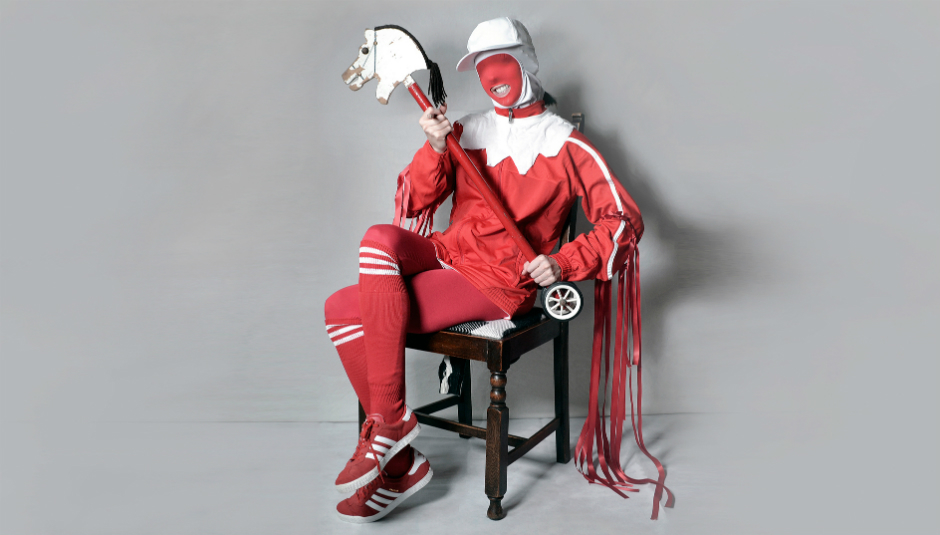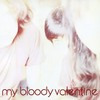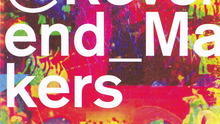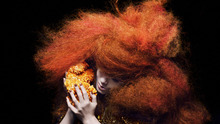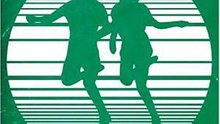“My mommy always said there were no monsters – no real ones. But there are, aren’t they?”
“Yes, there are.”
“Why do they tell little kids that?”
“Most of the time, it’s true.”
Sci-fi aficionados will recognize this piece of heart-wrenching dialogue from 1986’s Aliens, the sequel to Ridley Scott’s 1979 original space horror classic. Like many people who are now in their mid-to-late thirties, the film made a burrowing imprint within my psyche. But in the case of Elizabeth Bernholz, who records under the name Gazelle Twin, Aliens was the bedrock for all her creativity.
“And I will never deny that,” she tells me over Skype. “Pretty much everything I do comes back to that film.” Instead of covering her face when the chest-bursting scene came – like this scribe used to do – Bernholz found herself fascinated and enthralled. She remembers dreaming to become a movie prop designer as a young girl, letting her fantasies run rampant. “I was a fairly imaginative child. Looking at some of the drawings I made as a kid, they were slightly terrifying. I think I just use any opportunity to lose myself in another world, inhabit the skin of another character and to feel powerful in some way.”
The Bernholz family wholly embraced technology, despite living in a remote household in “a tiny Victorian farmhouse” near Kent. “We had the first Amstrad computer with this sort of cassette loading. Video game decks, floppy drives – we had everything, so I became quite computer-obsessed as a little girl. I think even at the age of four I was programming five-colour animations on our Amstrad by typing in about seventy pages of code. Both my parents are very creative, they were encouraging of me making things and exploring my environment. My dad was very much into science fiction, in literature, but also movies. So as a kid – because I’m the youngest of four, of a brother and two sisters – I got to see a lot of movies at an early age that I probably shouldn’t have.”
Looking at the malicious court jester prancing mirthfully on the cover Gazelle Twin’s latest LP Pastoral, the influence of the creature designed by H.R. Giger is fairly deductive. Like the xenomorph, this Red Imp – as Bernholz dubbed it, with emphasis on the word ‘it’ – flashes nothing but a wicked smile: disturbingly alien-looking, albeit just human enough to make it somehow believable. Another film that comes to mind is Jonathan Glazer’s Under The Skin which features Scarlett Johansson as a predatorial extraterrestrial disguised as a woman. She descends in Scotland, assimilating the surroundings and the complexities of human behaviour within a far-flung frame of reference.
Bernholz’ Red Imp, however, has more in common with the xenomorph in the sense that it absorbs and assimilates its direct milieu very obtusely. Unlike the album’s macabre protagonist, the backdrop of Pastoral is a familiar one for Bernholz – the English countryside like the one she was raised in as a kid. For the past couple of years, Bernholz, her husband Jez and her son Ezra, have resided on similar pastures: a country house in the sleepy commune of Leicestershire. A romantic would suggest that this kind of place would be idyllic to raise a child: a slow life of nature and tranquillity sheltered from the rambunctiousness of the city. The country life certainly hasn’t hampered Bernholz’ thirst for exploring her imagination and creativity the fullest. But these days, the world looks significantly odder than three decades ago.
“Having spent some time in Leicestershire and looking at things in detail, what you also get with a lot of rural living was and still is owned by the English nobility. And you still have the trickle-down sort of aspect of this political set up within that landscape. You have overworked farmers, broken industries. The local towns are kind of just depressing; it’s very monocultural, it’s very white, it’s middle-upper class, retired – what I’m saying is, I don’t believe that’s necessarily a better environment for my child. I would rather have him be in a much more multicultural community. To feel – not overstimulated – but just stimulated enough by good things, the cultural things that we have to offer in this country.”
In the wake of Brexit, these isolated rural communities have become more and more susceptible to nationalistic sentiments that spitshine the ugly historical chapters. The Red Imp quizzically invades the puritanical green landscape plastered on the album artwork; sporting hooligan trainers, straps, Adidas Gazelle sneakers all in the St George’s flag’s red-and-white colours. If Hieronymous Bosch were alive today, this is the type of character he would create to reflect these strange modern times. But in today’s world, The Red Imp would be a great comic book anti-hero. On ‘Dance Of The Peddlers’, one can imagine the creature skipping past youngsters playing a Skepta record on their mobile phones, then zeroing in on a lewd Daily Mail-header from a desolate newspaper stand. On ‘Better In My Day’ it appears to parrot a retired old lady scoffing at those very same youngsters intruding on her picturesque serenity. The storyboards basically materialize themselves when listening to Pastoral.
So The Red Imp becomes emblematic of all these modern-day absurdities, reconfiguring and reflecting them almost at random. It amplifies some of the inherent silliness of England’s colonial past as well; on ‘Better In My Day’, Bernholz samples an archaic flute flourish and attacks it with stark industrial beats, hedging the sheer futility of the narrator’s grievances with a slapstick sense of mischief. Alternately, on ‘Hobby Horse’, the beat pantomimes the trot of a medieval cavalcade with the same glee as Monty Python and The Holy Grail’s infamous coconut clasps. Bernholz: ”I suppose all these costumes represent an aspect of myself, they are like an inner voice. The Red Imp as an ‘it’, not a ‘he’ or a ‘she’. But multiple voices, multiple fears, multiple anxieties, multiple feelings of isolation. But also aggression and rage, mischief, mockery, and humour. It’s way more multifaceted than anything I’ve done before, and I enjoy that. Because I never felt like some sort of ‘comic’ performer in any way.”
For Bernholz, inhabiting this character allows Gazelle Twin to reach a more considerable breadth than if it would just be ‘as herself’. It’s no surprise the whole spirit of the record channels a long list of historical and cultural references, ranging from William Blake to the Alien-film franchise, as mentioned earlier. “It’s become such an important aspect from the very beginning for me, to make the most out of an idea. And to see it through, genuinely, without it feeling like some sort of gimmick. I have been accused of that in the past, and I understand why. But to step into this other character, it gives me way more flexibility and scope.”
In many ways, wearing these costumes incentivizes her to push specific ideas to their very extremes. It does, however, beg one question. With the freedom of not having to attach her person to her art, why does Bernholzfeel the need to delineate her work in interviews, instead of letting the work speak for itself? Can the characters she inhabits as Gazelle Twin simply live as separate entities? “Well, you can’t just be sitting there behind a veil talking like I am now,” Bernholz explains. “I think fairly early on, I felt there had to be some sort of separation. I’m not trying to live out this persona that’s constantly in that role all the time. That’s just pretentious. I have loads to say about the project. The best way to talk about that is to just be me, and leave the rest to these performances. But on social media, for example, I try to keep that more in-character. I’m not entirely prescript to that, but just a little. Because social media is a weird portal into another world anyway, isn’t it? It’s easier to extend the ideas into that.”
But, as fellow DiS-scribe Bekki Bemrose wondered in her review of Pastoral; is it enough to extend Gazelle Twin’s work beyond just the initiated margins? “It would be very interesting to see how it would be received in a broader world of music. But I don’t think it exists now. If I did this in the 90s, I would probably be getting some better exposure. Like MTV or Top of the Pops! Maybe even Jools Holland. But I just don’t think that kind of thing happens much anymore these days. The channels are different and the exposure is different. SIA has done it, and she has done some strange things. But then again, she writes pop music, and Gazelle Twin isn’t pop music.”
What both have in common, however, is using anonymity to make deeply personal reflections more universal and palpable. Obfuscating your image could compel the listener to zero in further on the content itself, rather than the person singing it. “I love a lot of SIA’s work, and some of the hits she had, and I love how she conveys her work visually. ‘Chandelier’ was about her struggle with alcoholism, and that was very personal, emotional, and painful. I like that decision to just turn around, perform and just have her voice, the words and the meaning at the forefront. And not having to put herself into this tradition of female artists that have to look and act the part. It’s an entirely different, maybe more convoluted way of working. But I’m trying to do the same thing. There is no way I would get on stage now and just be…”
Bernholz inhales sharply, cringing at the thought. “...in a dress, and chat in between the songs. It never felt comfortable to me. I don’t think I ever will be.” The fashion aspect of being a female musician and being marketed as a sexual object grates at her. “It’s almost impossible not to get into that if you have any kind of signing or any sort of physical reveal of yourself. Even if you don’t intend it, someone else will impose that on you. I’m relieved not have to think about any of that. If I do the odd interview as myself, I’m wearing my regular person clothes, my everyday face. Artistically, that’s not manageable up to a point, but to have to do that on stage all the time would drive me nuts.”
Pastoral addresses something even larger afoul than just the noxious male gaze in the music industry. Bernholz initially wanted to write a “baby album” with her husband. Retreating to the provincial setting of Leicestershire, away from the ruckus of Brighton, seemed like a logical step to one day raise a family. Moving to a property owned by Bernholz’ sister would also ease some of the financial strains. Touring of Gazelle Twin’s previous album Unflesh would finally be somewhat feasible. “The first two years passed quickly; we found ourselves touring and saving some money, we felt like we could just carry on because this could be a nice foundation to start a family; so… we just started a family!”
An experience of acute fear and desperation tailspinned that prosperous trajectory into something else entirely. “When I was three months pregnant with Ezra, we played a show in Paris. It was the night of the terrorist attacks at the Bataclan, which was just a mile away from us. I felt that was the point that most of the joys and excitement of having a child started to alter into something much more frightening than I anticipated. That experience has changed our mental approach to just the world that lives outside. I think that kind of kickstarted our instincts a little bit. To start retreating inward again. The feeling that we needed to protect ourselves a little bit more.”
With the rude awakening of Brexit two years later, suddenly, the sanctuary of rural life Bernholz experienced as a child didn’t feel so safe anymore. It has enabled the festering far right underbelly to further claw out of the woodwork. “For me, it’s this overriding feeling – I guess you call that maternal instinct if you believe in that sort of thing – the dissociative absence of comfort that seems to be happening. Not just being in the world, but that upturning of stones. If you were lucky enough to have a relatively stable and loving childhood, there were a lot of people you thought were looking out for you and your generation, working hard to make your life better. Now it feels like they are turning on you. As I had Ezra I felt like that, with the political stuff that was happening. Just that general frightened feeling. I suddenly had a child in a world that has become colder and colder, more fierce and more lacking in empathy.”
Raising Ezra within this world prompted Bernholz to find “an emotional purge” for her intrusive fears. In her makeshift studio, she started fleshing out rudimentary sonic sketches recorded predominantly on her phone. “It was quite necessary for me to come in and let off some steam and just get some of this stuff out that would have nowhere else to go otherwise.”
Before Bernholz started recording music as Gazelle Twin, she took on the moniker of Newt as a vehicle to do more commissioned work. “That kind of started as the idea of it being a halfway house between me as Elizabeth Bernholz as a singer maybe, just as a voice. But also between me as a producer as Gazelle Twin.” Indeed, the name is based on the little girl on Aliens who survived a horde of space monsters by her lonesome, stranded on a distant colonized planet. “I identified with Newt as a little girl, I loved the fact that she didn’t have to get to school, but was abandoned on a planet. How cool is it that she survived? I wanted to be just like her.” Bernholz can’t help but chuckle. “Tragic, really,” she playfully scoffs.
Like Newt, neither Bernholz nor her son has to live life under the false illusion of ‘happily ever after’. The Red Imp is just mum acting out her primal scream, not some scary monster hiding under the bed. Though Aliens-protagonist Ellen Ripley was right when she confirmed to Newt that monsters do exist, fear doesn’t have to beget fear if you make those fears tangible. Even from behind the dense studio walls, Bernholz’ son flaunts a pretty potent primal scream himself. “He’s got an incredible scream already. It’s quite deafening. He’s two now, and just figuring it all out. And that time is now his friend. That’s why mummy hides in another room this time of night, talking to other people.”
Pastoral is out now via Anti-Moon Ghost Ray. For more information about Gazelle Twin, including forthcoming tour dates, please visit her official website. Gazelle Twin will also play Rewire Festival in The Hague, held 29-31 March 2019.

